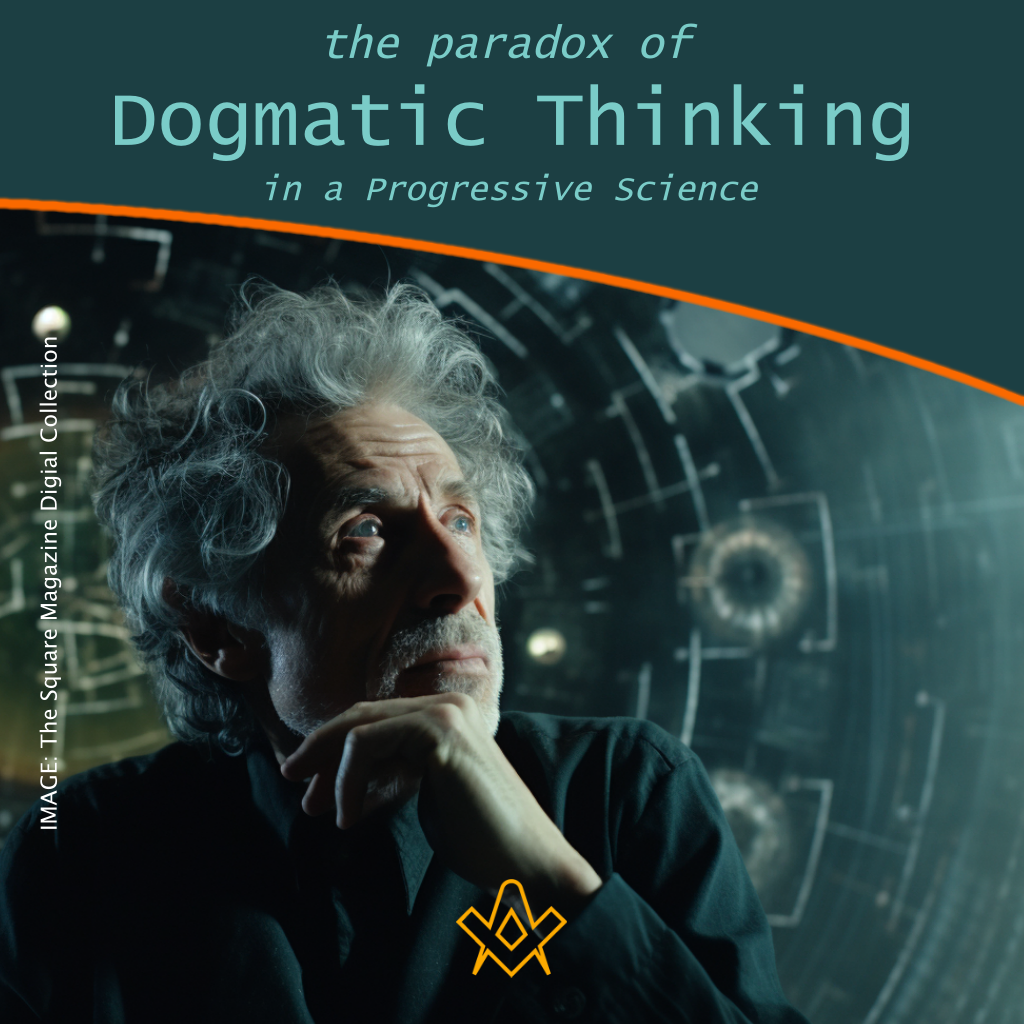Matt Fletcher would like to challenge some firmly held beliefs about Freemasonry, and how the Allied Masonic Degrees of Canada holds a unique position within the milieu of masonic orders in Canada to address less than accurate thinking about what is, and what is not Freemasonry, and how we have been given a unique opportunity to preserve what Freemasonry holds most dear.
The Ancient Charges of Masonry according to Preston state that a Master-Elect must accept and agree to the following statement:
‘You admit that it is not in the power of any Man or Body of Men to make any Alteration or Innovation in the Body of Masonry’ [1][2].
Mackey likewise stated that:
‘The first great duty, not only of every lodge, but of every Mason, is to see that the landmarks of the Order shall never be impaired’ [3].
This is a very commonly held belief in Masonry; that nothing can be changed. It is a cause for dissent in lodges, and the root of many arguments between masons, both in lodge and the festive board, or increasingly, on the internet.
We all grow up in particular and different masonic environments and are taught that what and how we do our work is traditionally the only right way to do it.
I recall once seeing a visiting Past Master correct a sitting Master on a point of protocol in open lodge, different in each other’s lodges.
That discussion did not do anything for either brother, and more especially cast a very dark cloud over the remainder of the meeting.
Why then do we insist on our own interpretation of the Masonry we have been taught, and demand compliance with it, rather than understand and accept that there are more variations than similarities in a lot of what goes on in a lodge room?
Social media permits us to associate with many brethren from even more jurisdictions than we can conceive, both regular and irregular according to somewhat arbitrary definitions, and therefore we can realise that there is a great variation in ritual and occasional practice within the myriad expressions of Freemasonry.
The variation between obligations and rituals from jurisdiction to jurisdiction are almost infinite. What is held dear within one may not be contemplated within another.
It is interesting to see how rigid some individuals are on the subject, without understanding that all that they know is in fact part of an evolving concept [4].
Innovation in Masonry is strongly discouraged; by Grand Lodges, by our own particular Rituals, and most especially by ourselves, as we naturally wish to preserve the ‘purity’ of what we have inherited for the benefit of our future brethren, such that we can transmit our Masonic heritage as we ourselves received it.
The rigidity of belief in a single ritual and expression of Masonry appears to come from the early Grand Lodges in the United States in the mid-1800s [5].
There is now a strong undercurrent within North American Masonry that we need to return to the original ideals and motives that actuated our forebears, and get away from the assumptions and social conventions that have crept in over the last 3 centuries of Freemasonry [6]; for example, such as not permitting Entered Apprentices to be full voting members of a masonic lodge, a practice never accepted by the United Grand Lodge of England, which was unilaterally accepted at the Baltimore Masonic Convention in 1843 [7].
What many Masons do not realise is that Masonry is an evolving philosophy and society. It is given to us in the strongest terms in the Second Degree that Masonry is a Progressive Science.
Progressive means ‘to move forward or to evolve’ [8]. This concept demands change… without it, there is no progress, only stagnation.
Charles Darwin wrote;
‘It is not the strongest of the species that survive, nor the most intelligent, but the one most responsive to change.’
This is a salutary reflection, as we are faced with a decline in the numbers of new candidates, and we struggle to deal with the loss of interest and participation of our older members.
There is a fundamental difference between supporting and championing the core values of what brought masonry into existence and the concepts that truly actuate it; and defending assumed traditions and regional practices that are not critical to the interpretation of the underlying philosophy [9].
Many Masons are unaware of how recent our concept of Masonry actually is. For example, in 1717 there were only two degrees, that of Entered Apprentice and Fellow of the Craft [10].
The Master Mason degree, and the Hiramic Legend did not enter the body of Masonry until the period 1723-30 [11][12][13].
The first 3rd degree appears to have been conferred in 1724, and the first mention of the Three Ruffians in the Constitutions of 1738 [14].
The rituals of Masonry were progressively built upon and expanded well into the first part of the 19th Century.
The Royal Arch, justly designated the completion of a Master Mason, did not come into existence until approximately 1730 [15].
We are dealing with relatively modern history here. The Shrine did not come into existence until 1872 [16].
Less than 150 years old! Likewise, the Most Excellent Master degree did not appear until the latter part of the 19th Century [17].
What we now call the Scottish Rite is a result of the explosion of philosophical higher degrees that flourished in France in the middle of the 18th Century.
As astutely pointed out by Chris Lirette, whilst we are also enjoined by our Landmarks to be peaceable and law-abiding subjects, from the first development of organised and speculative Freemasonry in the late 1600s, Freemasons have been activists for revolution and political reform [18].
Bolivar, Guerrero, Marti, Rizal, Garibaldi and the Independence of the United States of America are all examples of freemasons following the principles of fraternity, liberty and egality to enact radical political change [19].
The prohibition of the discussion of politics and religion in lodge demonstrates a similar set of parallels. From an Enlightenment philosophy that strongly encouraged revolutionary thinking, freedom, and equality, Freemasonry has evolved into a globally federated organisation which maintains and upholds political and societal stratification and control.
From a libertarian and idealistic origin, we have swung in the opposite direction and developed a highly conservative and reactionary standpoint.
It could be hypothesised that due to the widespread attempts over the last 300 years of many governments and the Vatican to proscribe Freemasonry, that the change in ethos of the principles of obedience and acquiescence to the State developed out of a desire for self-preservation of the movement, in order to reassure it’s detractors.
The 18th Century was a period of great change and innovation in Masonry; many things came into existence that had not heretofore been used; concepts such as the use of the Letter G are prime examples [20].
The letter G is not displayed in the lodge room, nor in the centre of the Square and Compasses in many jurisdictions worldwide.
Original Masonic aprons followed a significantly different format to those which we current wear; originally with a much longer fall and rounded corners. Is this not an innovation in Masonry? [21]
The simple fact that we now admit as Masons men with disabilities is against the original landmarks of Masonry.
Society has evolved and advanced, we have become more enlightened, and have recognised that social standing and physical disability are not valid reasons to exclude a prospective candidate who is otherwise worthy.
The earliest forms of Speculative Masonry were solely Christian; the first Jewish Brother was admitted in 1732 [22], and the first Jewish Lodge consecrated in London in 1793, although there was continued opposition by many that persisted until the mid-19th century [23][24].
Muslims were rarely admitted in the 18th century, and then only because they were deemed ‘valuable’ from a diplomatic or business perspective, and it was not until the 19th century that the tolerance for other religions became more pronounced [25].
There are many arguments regarding the continued exclusion of women from Masonry, and indeed a number of female Masonic obediences have developed over the last 150 years, not to mention co-ed orders [26].
Whilst not formally recognised, more progressive Grand Lodges have at least publicly and openly stated that these bodies are regular in their practices. Interestingly, the first female Freemason documented historically, Elizabeth Aldworth, was regularly initiated in circa 1711, prior to the development of the Master Mason degree, and long before the first Grand Lodge in North America was established in Virginia in 1778 [27].
Under the United Grand Lodge of England, of which I am a member, it is prohibited to publicly display evidence of my membership of Masonry, nor to advertise that fact by framing my certificate, let alone wear a masonic ring or display the Square and Compasses on anything I wear or drive. However, this is a commonplace practice in North America.
In the United Kingdom I can approach someone I believe would make a good Mason, although that is frequently prohibited in many North American Grand Lodges. These are all adopted customs based on our own collective interpretations of what our respective Jurisdictions’ ritual, history or rules teach us.
Yet, as a whole, Freemasons do not focus on these historical facts, because what we see, what we do, and what we believe in currently, and from our past experience, are important to us, due to our own frames of reference.
The strong trend towards increasing romanticism in Masonic pseudo-history as evidenced by the myths of the Knights Templar origin for example suggest that we as a whole are looking for a hidden historical truth to justify our existence, since the original aims of the first speculative masons appear to have been sublimated by more anodyne goals.
To make the claim that what we have received has come down to us unchanged, unadulterated, and free of innovation is patently false.
We should appreciate our diversity, and recognise that this is what makes us stronger and truly descended from a syncretic philosophy with it’s origins in time immemorial.
Every Mason globally has evolved according to a slightly different path and pedigree, and who is any one individual or Jurisdiction to state that they are right and all else is wrong?
We are facing a crisis in Freemasonry worldwide, due to declining numbers. No Grand Lodge is exempt, and many of our other Masonic orders are suffering similarly.
In 1959 Freemasonry in North America had a membership of over 4 million, now we number little over 1 million [28].
A critical analysis of the trends suggests that by 2043 membership will approach zero.
The other crisis that we appear to face is the increasing growth of that particular type of Freemason who seeks out orders, degrees, titles, and offices. Not necessarily due to the content of the varied orders and the teachings of the degrees, but possibly due to a desire to collect such, and perhaps satisfy a personal need for the approbation of others.
Whether you are an Entered Apprentice or a Grand Master, you all and each are my Brother, and that is the only title that truly matters. The white lambskin of each and every apron confirms our bond of fraternity, regardless of other colours and gold braid.
A title generates no inherent respect or value for the individual, only for the office. Respect is earned through our behaviour and what we do for the fraternity, not through the reception of a degree or title.
Many Masonic meetings now revolve around excessive attention to ‘business’, with the occasional degree as and when candidates present themselves.
I have heard Masons declaim with pride that their recent lodge meeting was accomplished in less than 45 minutes. This is a shocking indictment of how little Masonry means to some.
Dogmatic thinking sadly pervades much of modern Masonry, as has been evidenced by what we have just covered.
For a Progressive Science, in which we are exhorted to extend our researches into the hidden Mysteries of Nature and Science, much of current Masonic practice focuses only on regional agreements on the practice of rituals and an ever increasingly complex system of government and promotion.
It has essentially developed into a self-referencing bureaucracy which is missing it’s fundamental original goals, as it has become so concerned with it’s own structure and survival. Modern Masonry has become Kafkaesque.
Thus, should we continue to adhere to what we perceive to be our own form of unchangeable Masonry, or should we rather recognise that Masonry has been continuously evolving over the last 300 years?
Should we not recognise that in order for the movement to continue to be of the greatest benefit to mankind that we recognise that only certain facets are immutable in the philosophy that we hold so dear?
![]()
Modern Masonry has become Kafkaesque.
Most present here are Baby Boomers or Generation X; the views, expectations, and personal philosophies of Generation Y and the Millennials are different from ours, and what they collectively seek within Freemasonry is different to that which those from our generations started our own journeys looking for.
Technology has changed society profoundly, and the premise of a rigid and unchanging fraternity has much less appeal to the younger generations, as their values are quite different.
Truth is a much more fundamentally attractive concept to those who have grown up immersed in extreme information overload and manipulated opinion, as it is of inestimable benefit as a guide through a sea of false signposts.
All of the Allied Masonic Degrees brethren here present have received at least seven degrees in Freemasonry, and I would suspect that the average would likely be well over 20 different degrees.
Many of us have been in the chairs of different orders and units multiple times, and a significant proportion have held more senior positions in other Grand Bodies.
The Allied Masonic Degrees of Canada thus consists of a large number of highly experienced and diversified Masons, who love what we do and find it of such value that we commit significant amounts of our personal time to it. Our devotion is evident to those who start to look into the Order.
Moreover, the AMD has a unique double focus; the preservation and conservation of a number of obscure and uncommon degrees that might otherwise be lost, combined with a strong focus on the preparation and delivery of research papers exploring every aspect of Freemasonry and related subjects, and the robust discussion of these.
This is a most valuable combination; we have our roots firmly in our varied history, but are willing to study and explore these roots, our symbolism and goals, and re-evaluate them in modern light.
We have seen in District 4 that by combining strong attention to in depth Masonic research and education, and a clear willingness to work the different degrees that we have inherited from the Allied Masonic Degrees that we are receiving a large amount of interest in our Councils.
The members of Craft Lodges who are most interested in the educational programs are less than satisfied with what they are receiving, and are drawn to the Allied Masonic Degrees. This has led to an increased number of applications to join the Holy Royal Arch in order to petition our Councils.
Most importantly, we have found that providing our new and frequently younger generation of Brethren with not only an almost infinite panoply of material and avenues to study and explore, but also a framework where they are able to discuss these openly and with sufficient time, without prejudice and dogmatic adherence to fixed and often less than accurate beliefs, has generated a stream within our region that is producing a clear set of new Masonic leaders.
These new Masons are passionate and enthusiastic about not only what we are, but empowered by a clear understanding of our past, even more importantly possess a much clearer vision of where we are going in the future.
Critically, we must recognise that what attracted us to Masonry is not what may attract our future Brethren, and so we must not ignore the fact that with the change in generational perspectives, we must evolve and change in order to remain relevant, whilst still exemplifying the core values and teachings that has made us such a strong philosophy, and so ensure our continued survival and pertinence.
Stagnation is a guaranteed way to defeat our fundamental objectives.
I firmly believe that the Allied Masonic Degrees are a beacon of what true Masonry should stand for, and is one of the few hopes for us to preserve the philosophy that we care so deeply about.
For us to reach our true potential however, we must learn to adopt a more balanced view of our origins and the fact that innovation and change in Freemasonry has been a facet that has lead to our growth and survival over the last 300 years, and that to deny ourselves this simple truth is the single way in which we can ensure our final demise.
Allied Masonic Degrees of Canada: https://amdcanada.ca
Footnotes
Reference
[1]Doron D. Landmarks and Old Charges. Montofiore Lodge, 2002.
http://www.freemasons-freemasonry.com/doron.html
[2]Jantz P. The Landmarks of Freemasonry. 2004.
http://freemasonry.bcy.ca/texts/landmarks.html
[3]Mackey AG. The Principles of Masonic Law. 1856.
http://www.gutenberg.org/ebooks/12186
[4]Taylor JW. Freemasonry as a Sacred Retreat.
http://web.mit.edu/dryfoo/www/Masons/Essays/jtaylor-retreat.html
[5]Davis RG. Masonic Ritual is an Innovation. http://www.thelaudablepursuit.com/articles/2016/6/7/masonic-ritual-is-an-innovation
[6]Anon. A Laudable Pursuit II. 20019. http://theknightsofthenorth.org/laudablepursuit/
[7]Graeter RA. Reform Freemasonry? 2014. https://reformfreemasonry.com/wp-content/uploads/2014/12/Reform-Freemasonry.pdf
[8]Cambridge English Dictionary. https://dictionary.cambridge.org/dictionary/english/progressive
[9]Graeter RA. How to preserve and stimulate Freemasonry. 2014. https://reformfreemasonry.com/home/preserve-stimulate/
[10]Foundation of the Premier Grand Lodge.
http://www.freemasons-freemasonry.com/MADHAVAN_HiramicLegend.html
[11]Anderson J. Book of Constitutions. 1723.
[12]Prichard S. Masonry Dissected. 1730.
[13]Davis RG. Op. cit.
[14]Madhavan CS. The Hiramic Legend: Whence and wherefore. http://www.freemasons-freemasonry.com/MADHAVAN_HiramicLegend.html
[15]Davis RG. Op. cit.
[16] https://www.shrinersinternational.org/Shriners/History/Beginnings
[17]Fletcher MDA. The Cryptic Rite. The Architect, 2018. p117-120.
[18]Lirette CB. Rebel Masons. The Architect. 2017. P91-5.
[19]Ibid.
[20]Dwor M. The Letter G. http://www.freemasonry.bcy.ca/texts/theletterg.html
[21]Anon. Innovations. http://www.themasonictrowel.com/masonic_talk/stb/stbs/40-09.htm
[22] https://www.jewishvirtuallibrary.org/freemasons
[23]Ibid.
[24]Newman A. Jews in English Freemasonry. 2015. https://www.jewishgen.org/jcr-uk/Newman_papers/Jews_in_English_Freemasonry.htm
[25]Zarcone T. Freemasonry & Religion. In: Handbook of Freemasonry. Brill. 2014.
[26]Wisdahl S. Women and Masonry. Peace Council 11/4/19
[27]The Grand Lodge of Virginia. https://grandlodgeofvirginia.org/
[28]A Laudable Pursuit II. Op. cit.
Article by: Matt D.A. Fletcher
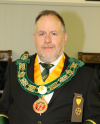
Matt DA Fletcher is the Sovereign Grand Master of the Allied Masonic Degrees of Canada; the Director-General of Studies of the Societas Rosicruciana in Anglia as well as Chief Adept for the SRIA Province of British Columbia & Yukon; is a past Grand Superintendent of the Supreme Grand Chapter of Royal Arch Masons of British Columbia & Yukon; and is or has been a member of almost every regular masonic body in current existence.
Initiated into the Three Pillars Lodge No.4923 in London, and a mason for almost 30 years, he is a subscribing member of bodies in the UK, Canada, the US, Brazil, Belgium & France. He also holds senior positions in a number of Martinist orders and bodies, and is deeply involved in the esoteric avenues beyond regular Freemasonry.
His primary objective is to increase the academic content within Freemasonry, such that we can practically expand and apply the knowledge that we learn in the Craft, and engage with and assist our Brethren more fully on their own personal masonic journey.
In the mundane world, he is a practising orthopaedic surgeon in rural Canada with a strong background in surgical research, and has published and presented over 350 academic and esoteric papers, chapters, and books.
Recent Articles: membership
 A Rose by any other Name may not be the same Explore the profound distinctions between conferred and transmitted Masonic degrees with Bro. Scott Wisdahl. Delve into how presentation quality, personal impact, and setting shape these rituals, and consider the potential for digital adaptations in modern Masonic practices. Join the discussion on enhancing the Masonic journey and preserving its essence. |
 Progression through the Degrees; a Rite or a Privilege? Exploring the layered journey of Freemasonry, Matt DA Fletcher probes the essence of progression—whether it's a mere rite or a privileged path. Delve into a nuanced perspective where every degree is not just a milestone but a fraction of a grander continuum. |
 Quantity vs Quality within the world of Freemasonry Dive into the compelling debate of quantity vs quality within the world of Freemasonry. Discover the transformative focus on attracting members aligned with the institution's values, promising not only growth but quality growth. High-value individuals assure sustainable development with their commitment to serving the brotherhood. |
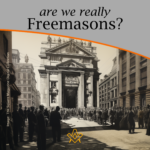 Maybe Freemasonry has opened its doors too wide. Perhaps some have not understood that the survival of Freemasonry in order to achieve its sublime purpose lies not in the number of members it has, but in their quality. Maybe we need less members and more Freemasons. Less men in Freemasonry and more Freemasonry in men. |
 What is ritual and why is it important? P1 Delve into the profound world of Freemasonry rituals and their significance. This insightful piece unravels the underlying importance of rituals, their impact on participants, and the transformative power they hold. Uncover why these centuries-old traditions remain integral to Masonic practice today. |
 Could Freemasonry be helpful for young men? Unravel the Masonic Brotherhood: Could Freemasonry be the antidote to modernity's challenges for young men? Dive in as we explore the Masonic world, its principles, camaraderie, and how its traditional rituals could help forge stronger identities in an increasingly complex world. |
 Discover the remarkable benefits of Lodge Meetings on your well-being. From fostering connections to combating stress, learn how these male-oriented gatherings offer an antidote to anger, hunger, isolation, and exhaustion. Dive into the power of shared experiences, understanding, and camaraderie. Your key to improved mental health awaits inside. |
 Tutorial for a Worshipful Master Unlock the Secrets to Leadership Mastery in our Worshipful Master's Tutorial! Brother Antonio Biella shares step-by-step guidance for Masonic Lodge leaders on honing their roles, duties, and future vision. Discover how to drive growth and engagement in your Lodge, setting ambitious goals and inspiring member participation. |
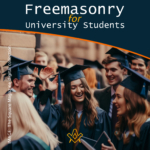 Freemasonry for University Students What are social skillset challenges facing students when they graduate from university ? |
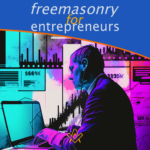 How the Core Values of Freemasonry; Brotherly Love, Relief and Truth Can Be Applied to Improve Productivity For Entrepreneurs |
 Why I became a Freemason: a personal journey of self-improvement Salik Tariq shares his reasons for becoming a Freemason – a journey of self-improvement, finding a community, and personal growth. |
 Freemasonry: Coming out of the Cloisters This paper examines the fundamental tensions on the lines of religion, gender and political ideology that exist in some jurisdictions of Freemasonry. It is on the first of these, religion, on which he makes an initial and exploratory focus. - by Gerald Reilly |
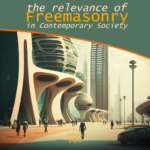 The Relevance of Freemasonry in Contemporary Society The role of Freemasonry in contemporary society is an indispensable one. Despite the challenges and misconceptions it faces, the organization remains steadfast in its humanitarian pursuits and commitment to personal growth and self-betterment. Through its efforts to evolve and adapt to the changing needs of its members and the world, Freemasonry continues to be a vital force in shaping a better future for all. |
 Has Freemasonry managed to revive and thrive after the darkness of the Pandemic? Robert Lomas gives us some (promising) insights. |
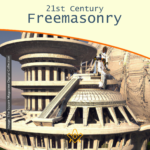 21st Century Freemasonry – a Sign of the Times? A recent article in The Times of London highlighted the dilemma 21st Freemasonry is facing. In this article one Master Mason shares his views of the strengths, and the challenges of modern Masonry. |
 A concept that is both based on our Freemasonic rituals and what we understand as teamwork. This article by Chris Batty examines why teamwork in the lodge is the network that binds us. |
 Lebanese Freemasonry has been both witness to and sometimes participants in turbulent events and forces, which shaped and influenced their world. |
 Is a Masonic Tradition Necessary? Dealing with Masonic tradition is a complex subject that requires careful analysis in order to reach a balanced point on the best etymological definition and the set of discourses and practices, which often end up being presented as such, without, however, presenting bases that support them, often serving only as a discourse that restricts and controls the masses. Fernando Rodrigues de Souza debates this complex subject. |
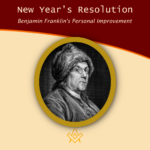 New Year's Resolution with Benjamin Franklin's Personal Improvement Are you ready for a new year's resolution challenge ? To accomplish his life’s goals, at 25 ( around 290 years ago ), Benjamin Franklin developed and committed himself to a personal improvement program that consisted of 13 virtues. You are invited to join me in practicing his daily routine for 2023. |
 The Alberta Masonic Higher Education Bursary Fund is to help the next generation of Albertans, our children and grandchildren, to obtain the education they need to lead successful lives and contribute to the welfare of mankind. As you can see from this little lesson of our history, education is truly a Masonic obligation. |
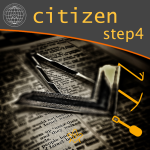 To be a Better Citizen of the World: Step 4 A value proposition for Pure Ancient Masonry as defined in terms of Citizenship; the allegories, symbolism and lessons are a blueprint for all Freemasons to be a better citizen of the world. |
 To be a Better Citizen of the World; Step 3 A value proposition for Pure Ancient Masonry as defined in terms of Citizenship; the allegories, symbolism and lessons are a blueprint for all Freemasons to be a better citizen of the world. |
 In connection with recent article about Freemasonry in the metaverse, we look at how an Egregore applies to Freemasonry in a digital world |
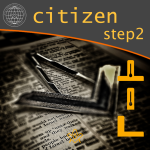 To be a Better Citizen of the World; Step 2 A value proposition for Pure Ancient Masonry as defined in terms of Citizenship; the allegories, symbolism and lessons are a blueprint for all Freemasons to be a better citizen of the world. |
 There are many brotherhoods in the world, and Freemasonry is one of the most significant and successful of them all. This article will be the focus two questions: the importance of brotherhood ? and is there room for improvement in Freemasonry? |
 Intergenerational relations in Masonry: challenges and possibilities Backed with scientific research, Professor Luiz Neto and Professor Alexandre Braune investigate the Intergenerational relations in Freemasonry and explores the challenges and opportunities. |
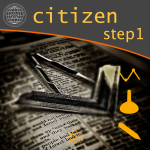 To be a Better Citizen of the World; Step 1 A value proposition for Pure Ancient Masonry as defined in terms of Citizenship; the allegories, symbolism and lessons are a blueprint for all Freemasons to be a better citizen of the world. |
 The Masonic Temple is a platform where both Freemasons and non-Masons, enthusiasts of real art and spiritual growth, connect to the new world of the metaverse. A Freemasonry in the metaverse project, based regular freemasonry principles. |
 Opportunity to fix the Sussex fudge Is there a value proposition for members, that under English Constitution Freemasonry, we have a 4 part offering; Entered Apprentice, Fellowcraft , Master Mason and Companion, conducted in a single craft lodge ? |
 Value Proposition of Freemasonry In addressing declining lodge membership and lack of attendance, we need to assess the value it offers to members. What is value, and what does it mean to you? |
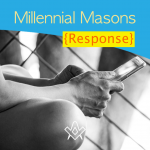 What is a 'Millennial' and what do they want from Freemasonry? You'll be surprised at the answers. |
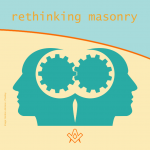 Let us help answer a fundamental question, from a confused newly raised brother asking “What does it all mean and where do I go from here?” |
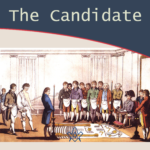 Written in 1930, much of the advice is still relevant today - although some may provoke further thought or debate! |
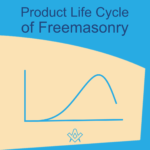 Product Life Cycle of Freemasonry An inconvenient truth about the product life cycle of Freemasonry |
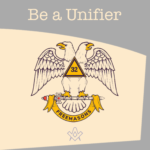 Freemasonry is local. This is where we need to start. We start with our Facebook friends, our neighbours, our colleagues, our lodges… |
 Freemasonry in the time of pandemic The Rule of Six. Localised lockdowns. Second wave? What do we do now?! The answer is simple - engage with members, promote Masonic education and get thinking outside the lodge. |
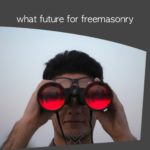 The current functioning of the Masonic movement has some positive aspects and others that are blatantly backward and counterproductive. |
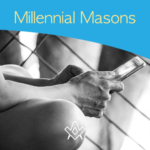 What is a 'Millennial' and what do they want from Freemasonry? You'll be surprised at the answers. |
 How to improve your Lodge Membership Marketing Program. |
 The Anti-Social Impact of Social Media The 'dark side' of social media and its negative effect on our mental health |
 If Freemasonry cannot meet, is this an opportunity to make a change to how we do things? |
 Has your lodge accepted an unknown candidate from the internet? Third in a three-part series looking at the process to accepting candidates via the internet |
 Is the brother of a brother a brother ? Rights to visit - recognition and regularity re-evaluated. |
 The second article in the Unknown Candidate series - Outlining the social media marketing process to attract the unknown candidate to make that first enquiry |
 Ask a random Freemason the purpose of Freemasonry and the likely response will be to “make good men, better”. Research undertaken by James Justin Davis Pennsylvania Academy of Masonic Knowledge. |
 Has your lodge accepted an unknown candidate from the internet? First in a three-part series looking at the process to accepting candidates via the internet |
 Mental Health - Raising its awareness and how we as Freemasons throughout the entire UK can help our fellow brethren and their families when they need it. |
 Share one thought why freemasonry is relevant today - Open question posted on Facebook with a very wide range of responses from Brethren across the globe |
 The Tipping Point of Freemasonry Why do brothers lose interest in Freemasonry and what can we do to get that spark back? At what moment did our own thoughts begin to waver? |
masonic knowledge
to be a better citizen of the world
share the square with two brothers

click image to open email app on mobile device
